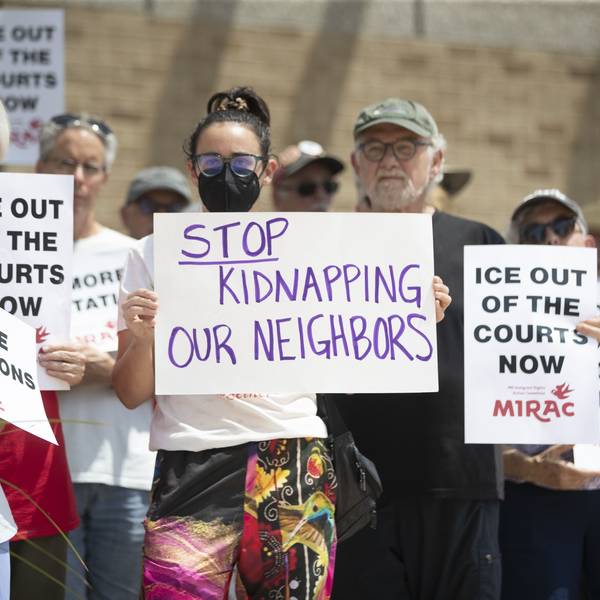Press freedom advocates on Tuesday issued last-ditch calls for the Biden administration to drop the case against WikiLeaks founder Julian Assange as the journalist and publisher's legal team appeared before the United Kingdom's High Court to fight his extradition to the United States.
The hearings on Tuesday and Wednesday will determine whether Assange, who is 52 years old and in increasingly poor health, can appeal an earlier decision by the U.K. government to approve his extradition to the U.S., where he could be hit with a prison sentence of up to 175 years for publishing classified information—something that journalists do all the time.
Assange's disclosures revealed U.S. war crimes in Iraq and Afghanistan, including the killing of two Reuters journalists.
"It's a terrible thing that this hearing is necessary," Jameel Jaffer, executive director of the Knight First Amendment Institute at Columbia University, said in a statement Tuesday. "The U.S. Justice Department should never have charged Assange under the Espionage Act, because the indictment and prosecution of a publisher under this act poses a grave threat to press freedom."
"The indictment focuses almost entirely on the kinds of activities that national security journalists engage in routinely and as a necessary part of their work—cultivating sources, communicating with them confidentially, soliciting information from them, protecting their identities from disclosure, and publishing classified information," Jaffer added. "A successful prosecution of Assange on the basis of this indictment would criminalize a great deal of the investigative journalism that is absolutely crucial to our democracy."
Rebecca Vincent, director of campaigns at Reporters Without Borders, said during a rally during Tuesday's hearing that "we're not letting the U.S. government off the hook today no matter what happens here in London."
"The responsibility still lies with the U.S. Department of Justice," said Vincent. "At any point, they could drop the charges, they could close this case, they could let Julian Assange free."
Assange did not attend the first day of the critical hearings in person or by video link for health reasons. The publisher has been languishing in a high-security London prison for more than five years while fighting extradition to the U.S., which his supporters and wife say would be a death sentence.
"We have two big days ahead," Stella Assange, whom Julian married in prison in 2022, told supporters at a demonstration outside the London court on Tuesday. "We don't know what to expect, but you're here because the world is watching. They just cannot get away with this. Julian needs his freedom and we all need the truth."
Seth Stern, director of advocacy at the Freedom of the Press Foundation, warned Tuesday that "as Assange inches closer to extradition, the danger to press freedom grows."
"An Espionage Act trial and conviction of Assange in an American court would be a disaster for journalists and for journalism," said Stern. "If the Biden administration cares as much about press freedom as it claims, it wouldn't wait for the U.K. to send this dangerous case to American courts. The Department of Justice should drop the Assange case now."
"The U.S. is actually engaged in an admission—an admission that they now criminalize journalism."
Assange, who has been fighting U.S. extradition attempts for more than a decade, was indicted under the Trump administration in 2019 on 17 counts of violating the Espionage Act, and the Biden Justice Department has decided to continue pursuing the case against the WikiLeaks founder despite dire warnings about the implications for press freedom.
Edward Fitzgerald, Assange's attorney, said during Tuesday's hearing that "is being prosecuted for engaging in ordinary journalistic practice of obtaining and publishing classified information, information that is both true and of obvious and important public interest."
Fitzgerald argued Tuesday that sending Assange across the Atlantic would violate the U.S.-U.K. Extradition Treaty, which prohibits extraditions for political offenses.
Should the U.K. High Court reject Assange's attempt to appeal, the publisher's legal team is expected to ask the European Court of Human Rights to halt the extradition, warning that his life is in danger. The U.S. has insisted it would not subject Assange to harsh treatment, but United Nations experts and human rights groups have said such assurances are not to be trusted.
Stella Assange told the Australian Broadcasting Corporation ahead of Tuesday's hearing that the WikiLeaks founder would not accept a plea deal with the U.S. Justice Department in exchange for a lighter sentence.
"The only thing that he would be pleading to is journalism," she said. "He is being accused of receiving information from a source, information that was in the public interest, that belonged in the public, and the U.S. is actually engaged in an admission—an admission that they now criminalize journalism."
"That is the case that has been brought against Julian," Stella Assange added. "Journalism has been re-classed as espionage. An unprecedented prosecution has been taken against a publisher for the very first time in the more than 100-year history of this Act and it is going to set a precedent. It already is setting a precedent that can then be used against the rest of the press anywhere in the world."




